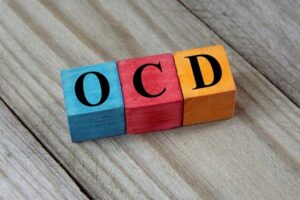Obsessive-compulsive disorder OCD is a mental health condition that can cause significant problems in a person’s life. It is characterized by intrusive and unwanted thoughts (obsessions) that lead to repetitive behaviours (compulsions). While OCD can be a debilitating condition, there are treatment options available that can help people manage their symptoms and live productive lives. In this blog post, we will explore the diagnosis and treatment of OCD. We will also provide resources for further reading and support.
Contents
What Is OCD?

Obsessive-Compulsive Disorder, or OCD, is an anxiety disorder characterized by obsessions (recurrent, unwanted thoughts) and/or compulsions (repetitive behaviours or mental acts that a person feels compelled to do in order to alleviate anxiety). People with OCD often experience excessive worry and fearfulness, which can lead to avoidance of certain situations or objects. The symptoms of OCD can interfere with daily activities and cause significant distress.
OCD is a treatable condition, though it can be challenging to seek treatment due to the stigma surrounding mental health. If you think you may have OCD, it’s important to see a mental health professional for diagnosis and treatment.
What Causes OCD?
There is no one answer to this question as the causes of OCD can be different for everyone. However, there are some common theories about what might contribute to the development of OCD. One theory suggests that OCD may be caused by a chemical imbalance in the brain. This theory is supported by the fact that many people with OCD respond well to medications that target these imbalances. Another theory suggests that OCD may be caused by genetics, as it often runs in families. This theory is supported by the fact that people with first-degree relatives (parents, siblings, or children) with OCD are more likely to develop OCD themselves. Still, others believe that OCD may be caused by stressful life events or trauma. This theory is supported by the fact that many people with OCD report having experienced a traumatic event prior to the onset of their symptoms.
Symptoms Of OCD
 There are many different symptoms of OCD, and they can vary from person to person. Some common symptoms include:
There are many different symptoms of OCD, and they can vary from person to person. Some common symptoms include:
• Repeatedly performing certain rituals or routines (such as washing your hands, counting, or checking things) in an attempt to relieve anxiety.
• Having intrusive and unwanted thoughts (such as fear of contamination or harm to yourself or others) that repeatedly enter your mind.
• Acting on urges to perform compulsions (such as hoarding, collecting, or excessive cleaning) in an effort to relieve anxiety.
• Avoiding certain situations or objects (such as dirt, germs, or sharp objects) that may trigger your OCD symptoms.
If you have any of these symptoms, it’s important to seek professional help. OCD can be a very debilitating disorder, but there are effective treatments available.
The Different Types Of OCD
There are four different types of OCD:
1. Checking OCD: This type of OCD is characterized by excessive checking behaviour. This can include checking things like the locks on doors, and appliances, and even making sure that nothing is going to hurt you.
2. Contamination OCD: This type of OCD is characterized by a fear of contamination. This can include things like a fear of germs, dirt, or even pollution. People with this type of OCD often engage in compulsive cleaning behaviours.
3. Hoarding OCD: This type of OCD is characterized by a need to hoard objects. People with this type of OCD may have a fear of losing important items, or they may just feel the need to keep everything they come into contact with. This can lead to severe clutter in their homes and an inability to let go of anything.
4. Rumination OCD: This type of OCD is characterized by repetitive and intrusive thoughts. These thoughts can be about anything, but they often centre around themes like death, violence, or sex. People with rumination OCD may also engage in compulsive behaviors like counting or touching objects
Medications For Treating OCD
 There are a number of different medications that can be prescribed for treating OCD, and the type of medication that is most effective will vary from person to person. The most common types of medications used to treat OCD are selective serotonin reuptake inhibitors (SSRIs), which work by increasing the levels of serotonin in the brain. Other types of medications that may be prescribed include tricyclic antidepressants, antipsychotics, and mood stabilizers.
There are a number of different medications that can be prescribed for treating OCD, and the type of medication that is most effective will vary from person to person. The most common types of medications used to treat OCD are selective serotonin reuptake inhibitors (SSRIs), which work by increasing the levels of serotonin in the brain. Other types of medications that may be prescribed include tricyclic antidepressants, antipsychotics, and mood stabilizers.
SSRIs are usually the first type of medication prescribed for OCD, as they tend to be the most effective and have the least amount of side effects. However, if an SSRI is not effective or if a person experiences severe side effects, another type of medication may be recommended. It is important to work closely with a mental health professional in order to find the best medication for each individual.
Therapy For Treating OCD
There are many different types of therapy that can be effective in treating OCD. The most common type of therapy is Cognitive Behavioral Therapy (CBT), which focuses on helping the individual to change the way they think about their obsessions and compulsions.
Other types of therapy that may be used include Exposure and Response Prevention (ERP), which helps the individual gradually exposure themselves to their fears and learn how to prevent themselves from engaging in compulsive behaviours.
Medication can also be an effective treatment for OCD, and there are many different types of medications that can be used. The most common type of medication is a selective serotonin reuptake inhibitor (SSRI), which helps to increase levels of serotonin in the brain.
OCD is a very treatable condition, and with proper treatment, most people with OCD can live normal, productive lives. If you or someone you know is suffering from OCD, please seek professional help.
Prevention Of OCD
Prevention of OCD can be difficult, as the disorder can be triggered by a variety of factors. However, there are some general tips that may help to prevent the development of OCD.
Firstly, it is important to identify and manage any underlying mental health conditions. Conditions such as anxiety and depression can increase the risk of developing OCD. If you are struggling with your mental health, speak to a doctor or therapist for help.
Secondly, try to reduce stress in your life. Stressful life events such as bereavement, job loss or relationship problems can trigger OCD. If you are experiencing a lot of stress, take some time for yourself to relax and de-stress.
Finally, avoid drug and alcohol abuse. Substance abuse can worsen OCD symptoms and make them harder to treat. If you are struggling with addiction, seek professional help to get on the road to recovery.
Conclusion
In conclusion, OCD treatment can be a long and difficult process but is possible. If you think you may have OCD, it’s important to seek professional help for diagnosis and treatment. There are many different types of medications and therapies that can be used to treat OCD, so it’s important to work with your mental health professional to find the best treatment plan for you. While there is no surefire way to prevent the onset of OCD, avoiding stress, managing mental health conditions, and avoiding substance abuse can all help reduce the risk of developing OCD.
For more information and guidance, please contact OCDMantra. OCD is a mental health disorder characterized by obsessions and compulsions. If you have any queries regarding OCD treatment, OCD Counseling, ERP therapy experienced therapists at OCDMantra can help: Book a trial OCD therapy session
